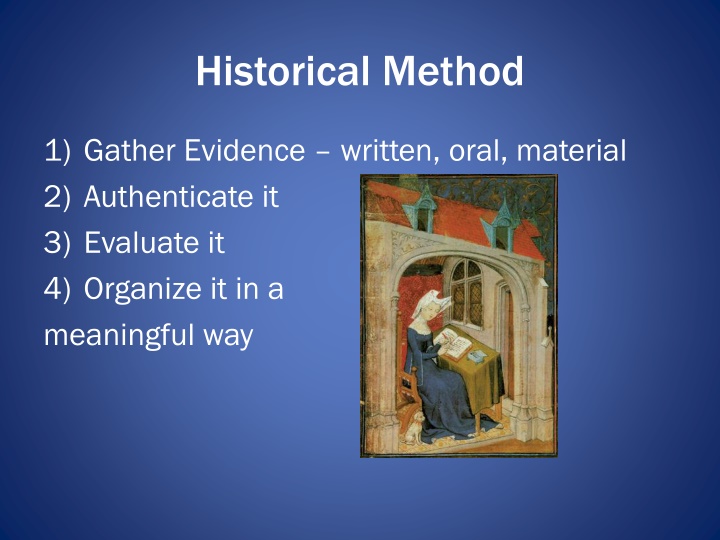
Understanding Historical Method and Interpretation
Explore the historical method of gathering, authenticating, evaluating, and organizing evidence, alongside concepts like mythopoetism, determinism, individualism, and theories based on human conflict. Learn about dating systems and the Gregorian calendar's significance. Discover how different calendars, like the Hebrew calendar, mark time.
Uploaded on | 0 Views
Download Presentation

Please find below an Image/Link to download the presentation.
The content on the website is provided AS IS for your information and personal use only. It may not be sold, licensed, or shared on other websites without obtaining consent from the author. If you encounter any issues during the download, it is possible that the publisher has removed the file from their server.
You are allowed to download the files provided on this website for personal or commercial use, subject to the condition that they are used lawfully. All files are the property of their respective owners.
The content on the website is provided AS IS for your information and personal use only. It may not be sold, licensed, or shared on other websites without obtaining consent from the author.
E N D
Presentation Transcript
Historical Method 1) Gather Evidence written, oral, material 2) Authenticate it 3) Evaluate it 4) Organize it in a meaningful way
a) Mythopoetism the use of stories (myths) to explain the past; evolves from oral traditions; e.g., Epic of Gilgamesh, Iliad b) Determinism the belief that some force external to humans controls the course of people s lives i. Theological (unfolding of Divine Providence); e.g., Ancient Hebrews, Early Christians, Puritans ii. Environmental (climate or terrain determined culture and character of individual peoples); e.g., Ancient Egypt, U.S. Republic
c) Individualism: Great Man/Woman Theory the belief that individuals and individual actions are important to historical developments i. Sidney Hook, The Hero in History a. Eventful man/woman happens to be at the right place at the right time b. Event-making man/woman able to control developments by force of personality ii. Theories based on human conflict (continued on next slide)
ii. Theories based on human conflict a. Hegel ideas determine the nature of society; historical change occurs as a consequence of conflict between opposing ideas (thesis v. antithesis) b. Marx economics determine the nature of society; historical change occurs through class struggle between exploiters and exploited c. Freud conflict is internal; individuals torn between conflicting demands of id and superego; i.e., The price of civilization is neurosis
Note on Dating Systems Gregorian calendar reflects Christian heritage of Western Civilization. Year 1 AD (Anno Domini or in the year of the Lord ) marks the year of Christ s birth. There is no year 0. The year before Christ s birth is 1 aCn (ante Christum natum) or 1 BC (before Christ). The abbreviations CE (common era) and BCE (before the common era) are also used for AD and BC respectively. The new year begins on January 1.
The Gregorian calendar replaced the Julian calendar in 1582 in most of the Roman Catholic world, in 1752 in Great Britain and her colonies, and in 1918 in Russia. In the Julian calendar the new year began March 25.
Other Calendars: Israel uses the traditional Hebrew calendar which dates from Creation. Rosh Hashanah occurs on the following days of the Gregorian calendar: Jewish Year 5775: sunset September 24, 2014 - nightfall September 13, 2015 Jewish Year 5776: sunset September 13, 2015 - nightfall October 2, 2016
For Muslims, year 1 dates from 622 CE or Anno Hegirae (in the year of the hijra), marking Mohammed s flight from Mecca to Medina. Since the Islamic calendar is lunar, the year is 11 12 days shorter than the solar year. Thus, the new year begins in different months of the Gregorian calendar; e.g., 1435 AH: 4 November 2013 1436 AH: 25 October 2014 1437 AH: 15 October 2015
Throughout much of ancient and medieval history dates also reflected political developments. Romans dated events from the founding of Rome (753 BCE) England used regnal years concurrently with the Julian calendar. The regnal year began the day of the ruler s accession to the throne. Thus, 1 Elizabeth ran from 17November 1558 to 16 November 1559.
